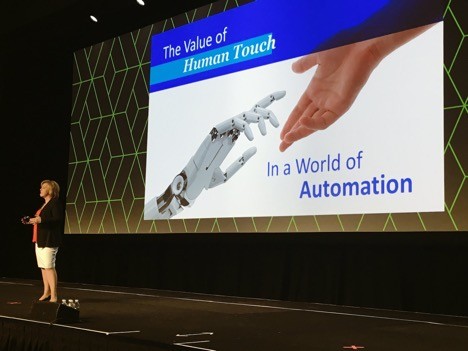The Value of Human Touch in a World of Automation
— May 3, 2017

The age of automation is going to be the age of do it yourself.” — Marshall McLuhan, 1964
I recently had the pleasure of delivering the closing keynote at CXFusion 2017. I spoke to conference attendees about the importance of human touch in an automated world. This topic is a daily tug-of-war we’re all experiencing at a consumer level.
From self-checkout to online banking to Amazon Go, more and more people are interacting with fully automated customer service. Yet, how many of us repeatedly “press zero” or say “agent” when we reach an automated service message on the phone? Given the opportunity to opt-out of automated service, the human touch of service from a team member presents an opportunity for creating positive and memorable customer experiences.
There are numerous human dimensions missing from the automated customer experience — listening, connecting, empathizing, personalizing and competence. Anyone who has gotten to the point of pursing their lips to say “Agent! Agent! Agent!” to inanimate interfaces of a service operation understands the qualitative value of these dimensions, which ultimately amount to: Caring.
That’s right. Care is what we want as consumers and what we strive for in providing quality, memorable service experiences to customers.
We know from experience that disengaged employees can sometimes be more frustrating to interact with than beeping machines. Resisting automation alone isn’t enough to result in service experiences with care. After all, employees won’t care about customers unless they feel cared for by their company — at least, the humans they relate to within it.
In the 2014 Maritz Employee Market Study, results showed 83 percent of employees feel good about the way their company treats their customers, but only 63 percent feel good about the way their company treats them. That says a lot about the way organizations consider their stakeholders, in order of priority — and employees feel the impact.
Employee engagement is at steady lows in the U.S. workforce and the costs of disengagement couldn’t be higher. Gallup estimates disengagement costs U.S. employers between $ 450 billion and $ 550 billion per year.
Aside from the impact on morale, engagement, and turnover, there’s a direct relationship between engaged employees and financial results for the organization. University of Michigan Professor of Business Dave Ulrich argues a 10 percent increase in employee engagement results in a 5 percent increase in client sentiment, which in turn results in a 2.5 percent increase in profits. Translation: Engaged employees create positive customer experiences and stronger financial success. In fact, Weber Shandwick reported The Engaged Company portfolio has outperformed the S&P 500 (including dividends) by 22.30 percentage points since October 1, 2012.
Employee engagement matters. Improving the employee experience has a direct impact on improving the customer experience.
In an increasingly automated world, take stock in the value of human touch in your organization. Consider engagement, turnover, sales, satisfaction and loyalty scores a roadmap for proving the effectiveness of organizational investment in self-development and engagement programs for employees. Promoting and fostering the value of human touch through engaged, connected people is more important than ever before.
“Never underestimate the power of the human element … the people aspect plays a key role in guest satisfaction and loyalty.” — J.D. Power and Associates
Business & Finance Articles on Business 2 Community
(21)

